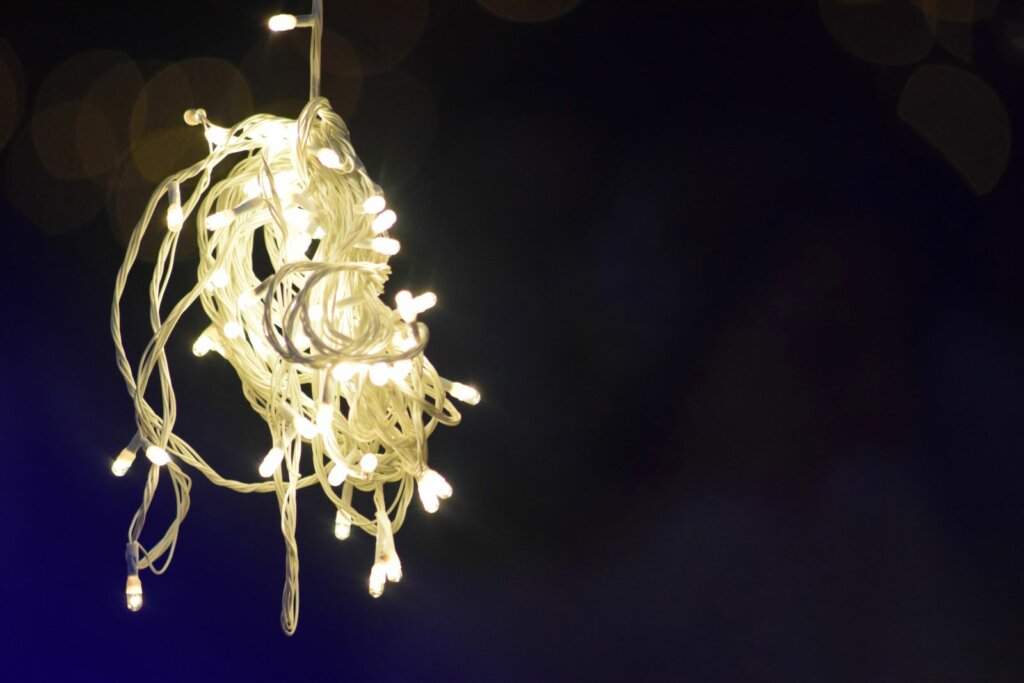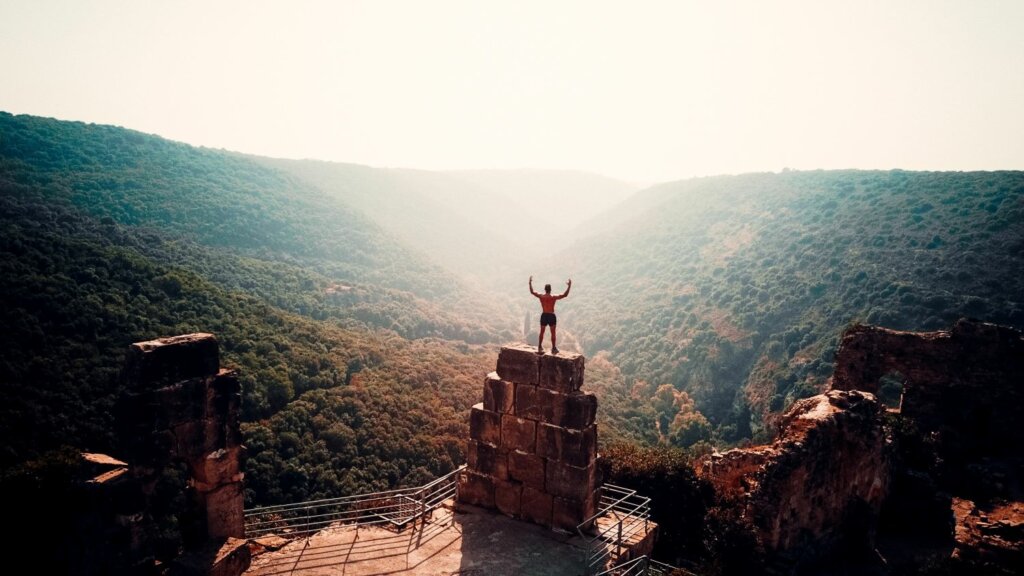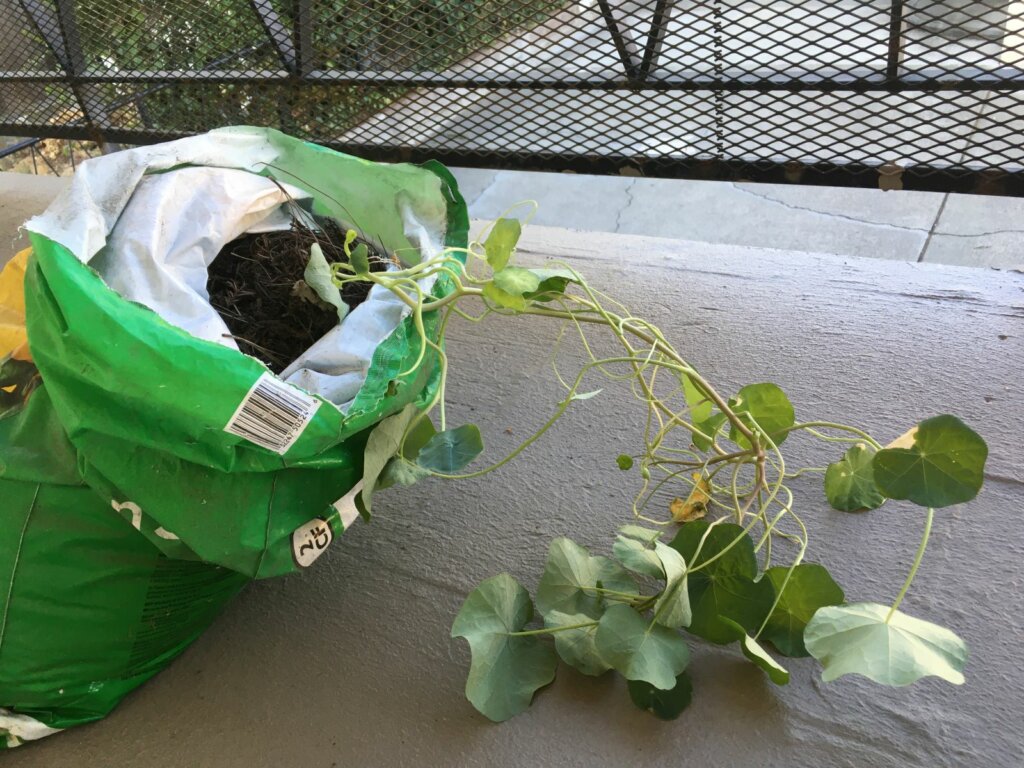Sometimes I put my happiness on layaway. I think about how amazing it will feel when I move somewhere big enough for a dedicated office space. When I have a house with a lush backyard illuminated with twinkling fairy lights. In the interim though, I’m in a one-bedroom apartment with no green space. Yes, I have plants in containers, but it’s not the same as a true backyard. Does that mean I’m doomed to be unhappy?
I’m currently reading the Artist’s Way and one of the exercises is to write out your ideal day. My ideal day includes, you guessed it, eating outside in a lush backyard illuminated with fairy lights. The author, Julia Cameron, asks, “What festive elements of your ideal day can you have right now?” Well, that certainly isn’t a question I ever asked myself.
I don’t have a backyard, but I do have a walkway that serves as a porch so on impulse, I purchased fairy lights to string along the railing and a camp chair to sit in. I’m still waiting for the fairy lights to arrive but tada! For less than $20 I gave myself something I’ve been dreaming of for years, or at least a small taste of it. I don’t have to earn more money to move to a bigger place, and then find the perfect place, and then live there. I can give myself what I want right here, right now.

My happiness includes fairy lights. Photo by muhammad asif on Unsplash
It begs the question, “Why was I waiting?” I was waiting because I wanted things to be “perfect” first. I wanted my ideal and not the less-than-ideal, as if only the ideal could make me happy. But is that really true? Psychology professor Robert Emmons says:
Research on emotion shows that positive emotions wear off quickly. Our emotional systems like newness. They like novelty . . . . But gratitude makes us appreciate the value of something, and when we appreciate the value of something, we extract more benefits from it; we’re less likely to take it for granted.
In effect, I think gratitude allows us to participate more in life. We notice the positives more, and that magnifies the pleasures you get from life. Instead of adapting to goodness, we celebrate goodness.
In other words, I can be happier, right now, by celebrating goodness. By enjoying that I have a porch to sit on, that the fairy lights will twinkle in dusky light, and that a breeze ruffles my hair. I don’t need to wait to feel pleasure. I can feel content right here, right now. It reminds me of Mary Oliver’s famous poem “The Summer Day.” She writes:
Who made the world?
Who made the swan, and the black bear?
Who made the grasshopper?
This grasshopper, I mean—
the one who has flung herself out of the grass,
the one who is eating sugar out of my hand,
who is moving her jaws back and forth instead of up and down—
who is gazing around with her enormous and complicated eyes.
Now she lifts her pale forearms and thoroughly washes her face.
Now she snaps her wings open, and floats away.
I don’t know exactly what a prayer is.
I do know how to pay attention, how to fall down
into the grass, how to kneel down in the grass,
how to be idle and blessed, how to stroll through the fields,
which is what I have been doing all day.
Tell me, what else should I have done?
Doesn’t everything die at last, and too soon?
Tell me, what is it you plan to do
with your one wild and precious life?
As for me, I plan on creating my ideal life before everything is perfectly in place. I plan on giving myself the simple things I yearn for, sometimes for years, before it looks exactly how I think it should. Instead of adapting to goodness, I plan on celebrating goodness.
I dream of a world where we stop waiting to give ourselves the simple pleasures we long for. A world where we make our dreams come true before they are perfect, before they are ideal. A world where we recognize positive emotions wear off quickly but we can cultivate contentment right here, right now.
Another world is not only possible, it’s probable.
What follows is a post from five years ago about dreams and delusions that is relevant as I continue to chase my own dreams. Enjoy.
I read an article in my university’s alumni magazine the other day about Andre Ingram, who at 32 became a rookie for the LA Lakers. Reading his story, I teared up because the whole thing seems so surreal, so unlikely.
Since he was 8 years old, Andre dreamed of playing for the NBA. He played in high school and then at our university. Once he graduated, he toiled for years in the NBA’s minor league. And I mean toiled – he made $13,000 for the entire season in the minor leagues, which is less than what NBA players make for a couple of games. He tutored kids in math while his wife also worked. He says he thought about quitting several times, and some friends advised the same, or to find a better payday overseas. But he persisted.
“Every time I was ready to jump off that ledge something pulled me back,” he said. “Whether it was in training, when I’m hitting every shot I take, or in the weight room getting encouraged by the guys. My story is to let that voice, let that encouragement, pull you back in.”

Sometimes a dream seems unlikely but then it happens. Photo by Edgar Chaparro on Unsplash
Andre is the oldest American rookie in the NBA since 1964. His story fascinates me because at what point does a person give up on their dream? Sometimes a dream is a delusion. We’ve all seen those auditions on TV where someone thinks they’re an amazing singer or dancer and they have zero talent. To the rest of the world, it’s obvious the person will never be a star, but they can’t believe it.
At what point is it harmful to keep believing in a dream? At what point is it better to let it go? I don’t have the answers to those questions. I’m sure many people told Andre it was unlikely he’d ever play in the NBA. A 32-year-old with gray hairs competing against people 10 years his junior? What are the odds he could share the court with them? But it happened.
What struck me the most about Andre’s story is that quote about how something kept pulling him back. Every time he wanted to quit something kept him from doing it. That to me reeks of intuition, which my spiritual teacher says “establishes the link between the crude world and the subtle world. And as a result of a closer link being established between the subtle and spiritual worlds, and as a result of its closer acquaintance with the sweetness of the spiritual world, this intuition guides human beings along the path of spirituality.”
It seems to me that if something keeps coming up over and over again, it’s intuition, guiding a person on their behalf. We don’t know how that journey will unfold, and it likely won’t look the way we want it to, but I have to believe if some dreams don’t disappear, then they are meant to become reality.
I dream of a world where we pursue our dreams if something keeps pulling us back in. A world where we recognize the fruition of that dream likely won’t follow the route we intended. A world where we understand something may seem out of reach, but that doesn’t always mean it is.
Another world is not only possible, it’s probable.
After a long day of staring at my computer screen, I walked outside to my apartment complex’s terrace where something caught my eye. Leaning against the far wall beneath an overhang is a bag of detritus. It’s filled with dirt and pine needles and everything workmen scooped out of our gutters from at least eight months ago, if not longer. Do you know what was spilling out of that bag?
A well-developed nasturtium vine. There are so many things about this that are astounding. Number one, I’m on that terrace every few days watering my plants. How did I not notice it before? And number two, it hasn’t rained here in MONTHS. How did that nasturtium vine survive?!? It’s not like any of my neighbors were watering a bag of soil in an attempt to keep a plant alive. And yet, not only did it survive, it thrived as you can see in the picture.
When I saw this plant, I literally laughed out loud because it was so unexpected and also miraculous. It reminded me that miracles are everywhere if we look for them. Miracles often have the connotation of being something big and obvious, but they can also be small and discreet, like this nasturtium vine.
I could use more miracles in my life. It’s easy for me to become disheartened by the ever-present pessimism in the news. Fires leveling towns. Floods. Famines. It’s a lot. And yet, if I look around, I also see evidence of miracles. Back in November, scientists captured footage of the black-naped pheasant-pigeon, which hadn’t been seen since 1882! In Brazil, the Golden Lion Tamarin used to be on the brink of extinction with about 200 animals in the wild, but the population has rebounded to around 4,800, according to a recent study.
Miracles happen every day with people surviving deathly car crashes, or getting pregnant when they thought they were infertile, or walking again when they were told it was impossible. It’s easy to think, “Well, that wouldn’t happen to me,” but what if it could? What if you could also receive a miracle? And like me with the nasturtium plant, what if miracles are all around and we’re just not noticing them?
Given the choice between a world where we’re all doomed and one where miracles take place, I vote for the latter. It reminds me of a concept we have in my spiritual tradition called madhuvidyá, which literally means “honey knowledge.” It requires seeing everything as an expression of an infinite loving consciousness, also known as Brahma. My spiritual teacher says, “This madhuvidyá will pervade your exterior and interior with … [ecstasy] and will permanently alleviate all your afflictions. Then the ferocious jaws of [degeneration] cannot come and devour you. The glory of one and only one benign entity will shine forth to you from one and all objects.”
That may not seem relevant but for me, practicing madhuvidyá means remembering God is here, there, and everywhere. And because everything is Brahma, everything is a manifestation of that infinite loving consciousness, then OF COURSE miracles are everywhere. How could they not be?
I dream of a world where we recognize the strange and the unlikely occurs all the time. A world where we make room for magic and mystery. A world where we understand this entire universe is composed of an infinite loving consciousness and from that place, we recognize miracles are everywhere.
Another world is not only possible, it’s probable.
For the past almost two weeks I’ve had pain in the spot where my shoulder and neck meet. My chiropractor characterized it as a drum beneath her fingertips. It’s pulsing, it’s intense, and as much as I would like to think it’s only from sleeping weird, I know that’s not the case. The mind and body are connected with the body acting as a roadmap for my life. It marks the terrain.
When I shared with my close friend what’s happening with my body, they said it sounds like I’m in the in-between place of “I’m stuck,” and “I take my power back.” In the chiropractic model I use, network spinal analysis, there are 12 stages of healing. The stages are fluid and not hierarchal, meaning I could cycle from stage 12 to stage three to stage nine all in the same day.
Stage three is “I’m stuck,” and stage four is, “I take my power back.” I struggle with making that jump. I’m really good at being stuck. I repeat patterns over and over again. I find myself in places where I can’t seem to escape from. Taking my power back? Not an easy thing for me. I’d much rather give my power away to someone else. Someone else has all the answers. Someone else knows what I should do. Someone else is the key to my healing. And sometimes that’s true but there’s a difference between saying, “I’m choosing to see this person or take this course/class because it feels in alignment” and “Aaaaaah! I’m stuck, I’m stuck, I’m stuck, let’s try this thing and that thing and that thing. Throw spaghetti at the wall!”

Not a spaghetti picture but a powerful one! Photo by Ameer Basheer on Unsplash
I usually throw spaghetti at the wall. I’m really good at trying random things from a disempowered place. It’s easy for me to take action. It’s not so easy for me to believe in myself. And yet, that’s what I’m here to do. The two tenets of my spiritual practice are self-realization and service to the universe. What is self-realization?
According to my spiritual teacher, “[I]t is the natural wont of each and every living being to see others, not to see [themselves]. That is, whenever one becomes a subjective entity, [they take] others as an objective counterpart, but never the self as an objective counterpart. One’s subjectivity never merges with objectivity and that is the trouble. You want to know so many things but you never want to know yourself. Your ‘self’ is your nearest entity but you never want to know yourself. That is the pity, that is the trouble.”
By knowing the self, I don’t mean just what my favorite color is, or even what my hot-button issues are. Knowing the self means knowing my true self, the self that’s always here, witnessing everything. The calm, quiet, inner voice within that’s ready and willing to help me if I let it. My recovery mentor tells me frequently, “Higher Power is very polite and only goes where invited.” When I invite my Higher Power into my life, that is a form of taking my power back. It’s me saying, “I can trust my self. I can trust my self to lead me where I need to go, to show me what actions to take.”
Knowing the self doesn’t mean becoming egotistical, that you shut out other people and say, “I already know everything.” Instead, knowing the self and taking your power back means being an active participant in your life and recognizing that not only is life happening to you, but you are happening to life. Both are true. There are circumstances outside of our control but some things are not. How are we showing up for life? I, for one, want to take my power back.
I dream of a world where we recognize the wisdom in knowing the self. A world where we understand that doesn’t mean arrogance but rather a recognition that a force within us guides us, shows us, and inspires us when we’re willing to listen. A world where instead of being blown about like a leaf, we take our power back.
Another world is not only possible, it’s probable.
